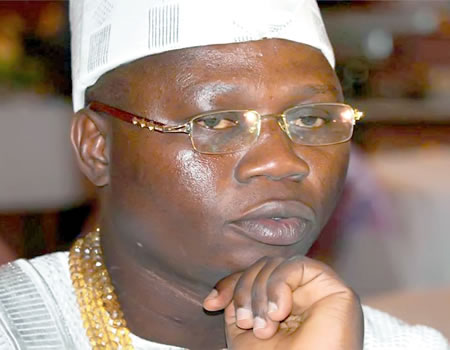Aare Ona Kakanfo of Yorubaland, Chief Gani Adams, speaks with journalists on issues of national interest, including the decision of the Inspector General Police (IGP), Mohammed Adamu, to partner with the Oodua Peoples Congress (OPC) in finding a lasting solution to the insecurity in the South-West. BOLA BADMUS was there.
WHAT is your assessment of the steps taken so far on the insecurity in the South-West, especially given the recent security summit held in Oyo State where the Inspector General Police (IGP), Mohammed Adamu, promised to partner with the Oodua Peoples Congress (OPC)?
I believe this is the beginning of a breakthrough on the issue of insecurity in the South-West. I do not have the knowledge that our name will be written on the basis of partnership with the Nigeria Police, but the six governors of the South-West agreed with the IGP, which is what we have been demanding since the security challenges started about two years ago, because there was a lot of pressure on me from the Yoruba people at home and in the Diaspora.
I usually inform them that the Aare Ona Kakanfo of today is a modern one, unlike the aare that existed during the time of Oyo Empire. Today, the Aare Ona Kakanfo has to follow due process, because of the sovereignty of Nigeria from 1914 onward to independence, where the security institutions are controlled by the Federal Government. Though I have the structure of the OPC, if the institutions do not agree with me, things will boomerang. If I dabble in the issue of security without the approval of the necessary institutions, there will be consequences.
I thank God that now, the police and the governors have agreed on the need to partner with the OPC. We must realise that the issue of security does not lie with the police alone. The Chief Security Officer of various states have more influence on the issue of security and we are lucky that three governors and two deputy governors who were present at the summit, as well as royal fathers, including the Ooni of Ife, representatives of the Alaafin of Oyo, Deji of Akure, Oba of Ugboland, Oba Aromolaran of Ijesaland, Alake of Egbaland, Oba Rilwan Akiolu of Lagos and the Olubadan of Ibadanland, all agreed that they were ready to complement the efforts of the police.
So, the crux of the summit is that the OPC is ready to partner with the police in tackling the issue of insecurity in the South-West region.
Are there plans to incorporate other relevant agencies who are not members of OPC in this new arrangement?
As the Aare Ona Kakanfo of Yorubaland, it is not only be the OPC that will be involved in this. All the relevant groups will also work with the police. I have been doing it even before this summit. I have been meeting with South-West vigilantes and the Agbekoya. Now, we want to extend the invitation to the hunters. By next week, we will meet with all stakeholders involved on how to build a structure that will liaise with the police. My duty as the Aare Ona Kakanfo goes beyond the issue of security. The unity of the Yoruba race is very paramount on my agenda. I am also interested in assisting our governors on the issue of the economic situation of Yorubaland.
The third aspect is the issue of cultural evangelism which we believe is one of the things giving us problems in Yorubaland. We want to encourage our royal fathers to continue in the promotion and propagation of the Yoruba race. We are fast losing our identity, because of education and civilization; and one of my duties as Aare Ona Kakanfo is to ensure that our culture is preserved and respected.
This partnership with the police, will it signal the end to the killings, banditry and other crimes we are witnessing in the South-West?
The partnership with the police will solve a lot of problems, especially on the issue of insecurity. In security, there is something they call ‘show of force.’ This alone can solve criminal activities by 40 per cent. What happened at the summit can be described as a psychological show of force. With the partnership with The Nigeria Police, most of the OPC members in the South-West who have been depressed about the issue of insecurity in the region will now wake up from their slumber. At the same time, those who refused to work with OPC members before, because we are not on good terms, will now work together, using OPC members for intelligence gathering and seeing them as partners in the fight against criminal activities.
The current IGP is a very clever man who is sincere about putting an end to insecurity in the South-West region. He was vice-president of INTERPOL for 11 years. He believes that for you to succeed as a police officer, there is the need for you to partner with your host community and other relevant groups. That is what he is doing now and he is achieving results without talking much. The partnership between the OPC and the police is a signal to the entire South-West that an end is in sight to criminal activities in the region. For example, when Bakassi Boys came out in the South-East, criminal activities were reduced to the barest minimum. But what happened? The police refused to cooperate with the Bakassi Boys and frustrated them and before you know it, criminal activities crept back into the South-East. Since these boys are fighting crimes, they are assisting the police in doing their job and what the police are expected to do is to give them support and tell them not to take laws into their own hands by carrying out jungle justice on criminals. When they arrest any criminal, they should hand them over to the police. That was one of the pleas I made at the summit. I told members of the OPC that they should not take advantage of the partnership with the police by taking laws into their own hands. So, I believe that the partnership with the police has already sent fears into the hearts of criminals in the South-West region. Before now, some of these criminals always hide under some police officers for cover when they are arrested by OPC members. But now, they know they don’t have anywhere to run to. There is no hiding place for criminals in South-West again.
Were there previous partnerships between OPC and police, and if yes, what were the results of the collaboration?
For instance, before we partnered with the Lagos State Police Command on the criminal activities of Badoo cultists in Ikorodu area of the state, we had the information on the kingpins, those behind Badoo in Ikorodu and Ogun State. We had all their names and the fact is, we knew where they lived, how they operated and the people behind them too. But we refused to divulge it to the police, because we don’t want to put ourselves in trouble. It was not until the police asked us to partner with them that we swung into action and within a period of two months, Badoo became a thing of the past and peace returned to the affected communities.
Another example is the issue of banditry in Festac and Ojo Cantonment area. They were kidnapping people and collecting as low as N50,000. Immediately they realised that I had moved out from my house in Abule Ado, they started their criminal activities. The matter became so worse that they kidnapped a Lieutenant in the Army. The Nigerian Army became furious about it and instructed the officer in charge of Ojo Cantonment to do everything possible to get rid of the criminal elements and rescue the Lieutenant. The head of the Ojo Cantonment now called some of our leaders in Amuwo-Odofin. He also called me, but I said it was an issue that could be handled by the OPC coordinators in the area. On the day of the operation, I drove to Abule-Ado to witness what happened. The officers of the Nigerian Army and OPC members went to the creeks and within three hours, they flushed out the bandits.
These criminals have about 30 buildings, shrines and other things in the creeks. After the operation, there has been no incident of kidnapping in the area and residents can now sleep with their two eyes closed.
In some parts of Lagos, like Epe and Ibeju-Lekki areas, kidnapping is still taking place. They kidnap some wealthy people and collect ransom ranging from N50 million to N100 million from them. Now, with the OPC/police partnership, a lot of things will change.
So, I think the IGP should be commended for this, because if you have a difficult task at hand and you have somebody that can assist you to get the job done faster, it will be unwise to ignore such a person and try to do it alone. United Kingdom, with all its police and sophisticated equipment, still makes use of civilians to get information about strange people. The same also happens in many other European countries. If advanced countries can do this, why can’t we replicate the same here?
What is your take on the call by some people on the government to invest in technology such as drones?
I heard many of the speakers at the summit talking about investment in technology. To me, I believe it is not about the use of technology alone. If you have all the technologies in this world and there is no sincerity and trust, you won’t achieve any meaningful result. Those who monitor CCTV, for instance, if they have been compromised and they see certain things, they would not inform the relevant authorities, because they are wining and dining with the criminals. But when there is sincerity, even somebody without gun can perform wonders and do better than the person with the most sophisticated weapons, when it comes to security matters.
It is not as if the OPC is eager to partner with the police on security for personal gains. To me, it is a call to service to defend my ancestral land. I am not a security person from the beginning; I am one of the freedom fighters in this country who fought for the restoration of democracy. I have been in this struggle since 1993. I have a lot of experience psychologically and also have a lot of native intelligence. I know how we can assist the security agencies in this country in reducing crime to the barest minimum, both physically and spiritually. However, we won’t expose our strategies to the media. As the Aare Ona Kakanfo, I will ensure all relevant groups in the South-West are incorporated in this project. It will not be an OPC thing alone. On my part, I have been partnering with our elders in Afenifere, Yoruba Council of Elders, Yoruba Unity Forum, etc. I will coordinate them to be security stakeholders so that we can achieve a common goal in the fight against insecurity by liasing with not just the police, but also the Department of State Services (DSS), Army and other security agencies.
The governors are the Chief Security Officers (CSOs) in their respective states. What are their roles in this new arrangement?
The governors have their own plans too to checkmate the excesses of criminals in the South-West. We have two phases. First is the arrangement of the IGP. The IGP is bringing a special squad that relevant groups will liaise with on addressing insecurity challenges. The governors are also making local arrangements. All the six governors in the South-West have purchased patrol vehicles which have been shared to all the local securities. We used to have forest guards, but today, they are no more in existence, because the local governments refused to pay their salaries, as all the money have been collected by the governors. The forest guards would have given us enough intelligence on the activities of killer herdsmen and the criminals among them. The rural securities coordinated by the governors will go into the rural and urban areas and complement the efforts of the Nigeria Police with information. They don’t need to carry guns, but they would work with the police so as to achieve a common goal.
Are you satisfied with the response of the Federal Government on the xenophobic attacks on Nigerians in South Africa?
There has been a pressure on me to issue a statement on this matter and I can confirm that as of this moment, no life has been lost. The videos being circulated are old videos. That is why you can’t see pictures of killings in traditional media, because they have the facts. Most of the gory pictures being circulated are on social media. In this era of social media, anybody that has data is now a journalist in his own right.
On the issue of the xenophobic attack in South Africa, I am a regular traveller to South Africa. The issue is from both sides. I condemn the action of a few criminal elements in South Africa. South Africans are lovely people. They are very hospitable and accommodating at their own level. I am speaking with facts. Most of the professionals in South Africa are Nigerians.
The last time I travelled to South Africa, I went to see a dentist who is from Congo. During our conversation, he mentioned about 50 Nigerian medical doctors whose establishments are in South Africa. If we bring 20 of these doctors to Nigeria, they will turn around our medical sector. He said the best black neurosurgeon in South Africa was a Nigerian. Also, a majority of the best lecturers in South Africa today are Nigerians.
So, I think we should manage this xenophobic crisis carefully. I agree with the Federal Government because when you don’t express your displeasure over what happened, the other country would not know your worth. The attacks are condemnable and I implore the South African government to go back to history and think of what Nigeria did for their liberation during the apartheid era. All the universities in Nigeria contributed to their struggle for independence of the whites. When they refused to release Nelson Mandela, our musicians waxed albums calling for his release.
So, we have done a lot for them and any shortcoming from Nigerians has to be forgiven by South Africans.
On the side of Nigerians, parents who have children in South Africa should talk to them on the need for proper behaviour. Some Nigerians are involved in drug business in South Africa and they encourage South Africans to also get involved in drug dealings.
Also, some Nigerians will go to parties and clubs to oppress these South Africans. They buy champagne worth millions of naira and pour it on their heads while the citizens of South Africa are struggling to buy a bottle of beer. When you are in a foreign country and God has blessed you, you need to be moderate in your dealings.
South Africa people too should be careful, because they have lots of investments here, such as MTN, Multichoice and Stanbic Bank. Inasmuch as they have investments here and our government is protecting them, they too should protect the interests of Nigerians living in South Africa. Look at what happened here when Nigerians wanted to carry out reprisal attacks. Our security forces still protected South African businesses, despite the fact that our citizens are being humiliated in South Africa.
WATCH TOP VIDEOS FROM NIGERIAN TRIBUNE TV
- Let’s Talk About SELF-AWARENESS
- Is Your Confidence Mistaken for Pride? Let’s talk about it
- Is Etiquette About Perfection…Or Just Not Being Rude?
- Top Psychologist Reveal 3 Signs You’re Struggling With Imposter Syndrome
- Do You Pick Up Work-Related Calls at Midnight or Never? Let’s Talk About Boundaries






